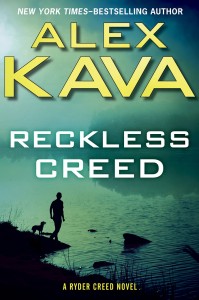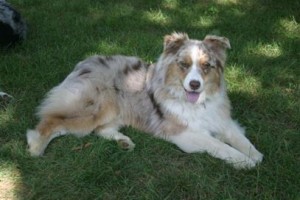Alex Kava is the internationally bestselling author of fifteen thrillers which have been published in thirty-two countries. In 2015, she launched a new series featuring Ryder Creed, a former marine turned K-9 search-and-rescue dog trainer and Maggie O’Dell, a character from the previous series.
Reckless Creed, Alex Kava’s sixteenth thriller, finds Ryder Creed at the center of an ominous case. In Chicago, a young man jumps from his hotel room window; in Alabama, the body of a young woman is found; and along the Missouri River, hunters stumble upon a lake whose surface is littered with dead snow geese. Before long, Ryder and O’Dell discover the deaths are connected by a conspiracy and a deadly virus.
Ryder Creed is a different kind of investigative character. Tell us a bit about him.
He’s different because he’s not from law enforcement. That’s one reason I brought Maggie O’Dell into the story, so she could put together the law enforcement pieces of the puzzle. Ryder is a reluctant hero. He would be content to simply live his life in the company of dogs and not get terribly involved with people.
When I began writing the Maggie O’Dell series, I knew next-to-nothing about law enforcement and had to research nearly everything. I’m finally writing about something I know and love: dogs.
Ryder often gets pulled in to help other people, and wants to do the right thing, which can take him into situations he shouldn’t be in. He’s a refreshing character to write about because he’ll confront danger even though it’s not necessarily his job to do so.
Integral to Reckless Creed is a tracking dog’s ability to smell and detect various odors. Tell us about this ability.
It’s incredible. Dogs actually have different layers for sifting through scents. Out in the open, they sometimes begin breathing rapidly and bring air into their nasal passages, sorting through the scents.
A handler told me a good way to understand dogs’ ability to sort through odors was with this analogy: if we have a pot of beef stew on the stove, we smell stew. But dogs can smell the individual ingredients—the beef, carrots, potatoes, the onions—and sift through each of the scents.
So, dogs have an exquisite olfactory inventory. In Reckless Creed, you describe virus-sniffing dogs, which makes me think of the real life issue of dogs being used for medical detection. Will you talk about that?
Several organizations are researching using dogs to detect certain kinds of cancer. They’re now being used to detect diabetes. There was a case in the UK detailing how a little boy with Type I diabetes had a dog trained to wake up the parents during the night if the boy’s insulin level was low. The dog’s sensitivity was so great, the child could play football with the dog sitting on the sidelines, yet even from that distance, it could alert the parents if the child’s blood sugar was either too high or low.
Research is being done on dogs’ detection ability with cancer cells. There have been studies where they’ve determined dogs can detect certain types of cancer at an earlier stage than any of our most sophisticated testing methods. This includes prostate, breast, and lung cancer. All that’s needed is a breath sample from the patient.
I met a young girl in Denver whose dog was able to alert her and summon help when she was about to have an epileptic attack.
These extraordinary abilities will be put to further use in the health care as well as in the security and law enforcement fields.
Can dogs sniff and detect something like bird flu or C. difficile without themselves becoming infected?
Yes. They’ve taken dogs into nursing homes because elderly people are so susceptible to C. Diff. Dogs can detect it at an earlier stage than more traditional methods. If it’s caught at an earlier stage, lives can definitely be saved. And fortunately, dogs cannot contract C. Diff.
As for bird flu, there’s not much research about that. But I’ve talked to some veterinarian friends—who are vital research resources for me—and they’ve told me there’s a flu in dogs that resembles bird flu in humans. They’ve been using a viral antidote for it.
You’ve written both series and standalone novels. What are the advantages of each?
I never intended to write a series when I started the Maggie O’Dell stories. I intended the first book to be a standalone, but the publisher wanted a second one, then a third, and then it became a series. I learned how to write a series by the seat of my pants. Looking back, that’s what kept Maggie so fresh: I was getting to know her along with my readers.
There’s something rejuvenating about writing a standalone novel. Even though it’s comforting to have a series with the same characters surrounding you each time, with a standalone, you create an entirely different group of people. I try writing each of my series’ novels to read as if it were a standalone. The process of writing a standalone allows me to create a whole new world.
What do you love about the writing life?
I love coming up with twists and turns, and believe it or not, I love doing research. I love learning new things. I’m a news junkie, so if something taps my interest, I start digging. And I come up with plots and sub-plots from what I’ve read, and then I go wild with them.
You’re hosting a dinner party and can invite any five people, living or dead, real or fictional, from any walk of life. Who would they be?
I would start by inviting Harper Lee because To Kill a Mockingbird is my favorite book. It would be amazing to be able to talk with her. Then, I’d invite Alfred Hitchcock because I love using the Hitchcockian approach to suspense thrillers—bringing the readers to the edge and leaving them there. My next guest would be Scout Finch. Can you imagine Scout contradicting some of the stories as Harper Lee would be trying to tell them? Amelia Earhart is fascinating, so I’d invite her. And the fifth would be Jack London, a real dog person, because I just loved Call of the Wild.
What’s coming next from Alex Kava
The next book is Lost Creed and deals with the mystery surrounding Creed’s sister, Brodie, who disappeared from a rest stop during a family road trip. Brodie was only eleven and Creed was fourteen when it happened.
Congratulations on writing Reckless Creed, an unusually suspenseful and provocative thriller detailing the chilling possibilities we face in today’s unpredictable and dangerous world.





 Eight years ago, when we paid $1,200 — a sum considerably higher than we ever paid before for a pup — Jenny was a seven-week-old, cute, rambunctious Australian Shepherd puppy.
Eight years ago, when we paid $1,200 — a sum considerably higher than we ever paid before for a pup — Jenny was a seven-week-old, cute, rambunctious Australian Shepherd puppy.